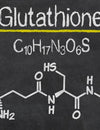Oxidative stress occurs when there are too many oxidants and not enough antioxidants to protect the tissue from damage.
Therefore, oxidative stress been recognized as playing a major role in neurodegenerative diseases like Alzheimer’s disease (Manoharan S, et.al., 2016, Hroudova J, et.al., 2014, Chen X, et.al., 2012).
All tissue including nerves are exposed to free radicals from the body’s own metabolism as well as from the outer environment.
It has been found that cognitive function positively correlates with antioxidant levels in patients with mild cognitive impairment (Baldeiras I, et.al., 2008). This research also shows that most of the oxidative changes found in mild Alzheimer’s disease are already present in mild cognitive impairment. The progression of Alzheimer’s disease might be accompanied by antioxidant depletion.
Neurons which are the major cells of the nervous system are susceptible to direct injury from free radicals. But also, they are indirectly susceptible. Oxidative stress activates mechanisms that result in inflammation causing additional damage (Wang JY, et.al., 2006).
I think you agree that it is crucial to have good antioxidant protection to protect your nervous system from injury.
Glutathione is an important antioxidant the body is producing which is present in the brain and other tissue.
Research has demonstrated that increased cellular levels of glutathione protect neurons against damage from oxidation. It also protects the loss of mitochondrial function (Boyd-Kimball D, et.al., 2005). The mitochondria is the energy producing entity of the cell and is very important.
Neuronal death has been associated with glutathione depletion in nerve cells (Abramov AY, et.al., 2003).
Glutathione is a very effective antioxidant. But, there is one problem. The body is producing less of it as we get older. We need more protection as we get older, not less.
There is, however, an effective way to supply glutathione to your cells, and that is by using S-Acetyl Glutathione.
S-Acetyl Glutathione is the only form of glutathione that has been found to get into the cells where it is needed (Caccaiatore I, et.al., 2010). This could provide you with valuable protection.
References:
Manoharan, S., Guillemin, G. J., Abiramasundari, R. S., Essa, M. M., Akbar, M., & Akbar, M. D. (2016). The role of reactive oxygen species in the pathogenesis of Alzheimer’s disease, Parkinson’s disease, and Huntington’s disease: a mini review. Oxidative medicine and cellular longevity, 2016.
Hroudová, J., Singh, N., & Fišar, Z. (2014). Mitochondrial dysfunctions in neurodegenerative diseases: relevance to Alzheimer’s disease. BioMed research international, 2014.
Chen, X., Guo, C., & Kong, J. (2012). Oxidative stress in neurodegenerative diseases. Neural regeneration research, 7(5), 376.
Baldeiras, I., Santana, I., Proença, M. T., Garrucho, M. H., Pascoal, R., Rodrigues, A., … & Oliveira, C. R. (2008). Peripheral oxidative damage in mild cognitive impairment and mild Alzheimer’s disease. Journal of Alzheimer’s Disease, 15(1), 117-128.
Wang, J. Y., Wen, L. L., Huang, Y. N., Chen, Y. T., & Ku, M. C. (2006). Dual effects of antioxidants in neurodegeneration: direct neuroprotection against oxidative stress and indirect protection via suppression of gliamediated inflammation. Current pharmaceutical design, 12(27), 3521-3533.
Boyd‐Kimball, D., Sultana, R., Abdul, H. M., & Butterfield, D. A. (2005). γ‐glutamylcysteine ethyl ester‐induced up‐regulation of glutathione protects neurons against Aβ (1–42)‐mediated oxidative stress and neurotoxicity: Implications for Alzheimer’s disease. Journal of neuroscience research, 79(5), 700-706.
EFFECTIVE S-ACETYL GLUTATHIONE
Glutathione is your primary defense against aging.
It’s a very effective antioxidant that the body makes to protect itself from free radical damage (oxidative stress). You can take this to help repair cells that are damaged by stress, radiation, pollution, infection, and other illnesses.
Research has established increased oxidative damage from lipid peroxidation as well as protein, DNA and RNA oxidation in areas of the brain has as early events in Alzheimer’s disease (Markesberry WR, Lovell MA, 2007).








